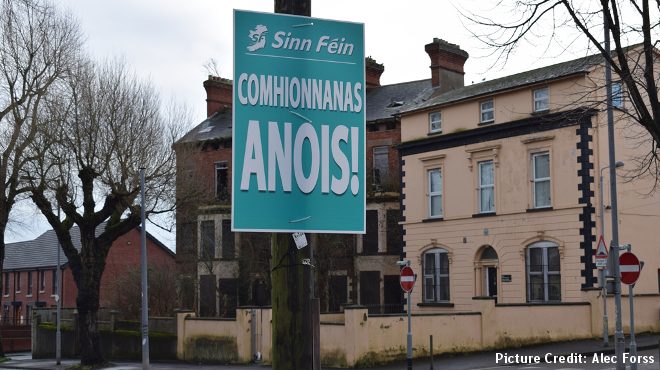Northern Ireland’s “Stale” Politics

Continued failure to identify a shared political vision for the future hampers any prospect of a genuine fresh start after the Northern Ireland’s election, argues Alec Forss.
Northern Ireland’s election to the Stormont assembly on March 2 was billed as the most important since the signing of the 1998 Good Friday Agreement, the peace deal which largely brought to an end three decades of violent conflict.
Triggered by Sinn Fein’s – the main nationalist party in favour of a united Ireland – collapsing of the power-sharing executive (a provision of the peace deal) through the resignation of Deputy First Minister Martin McGuinness, the party claimed to want the election to be a referendum on the Democratic Unionist Party’s (DUP) botched handling of a renewable energy scheme.
A Brutal Election
The DUP’s leader, Arlene Foster accused Sinn Fein of political opportunism to increase their vote and promised the election would be “brutal”. Deflecting attention away from the energy scandal, the DUP brazenly played on its electorate’s fears by arguing that a vote for the DUP represented the only bulwark against a united Ireland.
In doing so, it mobilized its favourite bogeyman, Gerry Adams, with one viral image depicting Sinn Fein’s newly installed northern leader, Michelle O’Neill, as being firmly in Adams’ pocket. After having shared power for the last ten years, the gloves were off and Sinn Fein accused the DUP of sectarianism and disrespect.
When during the campaign Foster declined to support an Irish language act saying, “if you feed a crocodile it will come back for more,” she betrayed her party’s and her constituency’s logic that even small concessions are the thin end of the wedge for a united Ireland – thus aptly illustrating the zero-sum game of identity politics amidst the bipolar configuration of power.
Northern Ireland’s raft of smaller parties sensed an opportunity to tap into wider public discontent at the perceived dysfunctional state of politics. Notably, Mike Nesbitt, leader of the Ulster Unionist Party – the DUP’s Unionist rival – courted both controversy and praise when he indicated he would give his second-preference vote to the SDLP, the second-largest nationalist party after Sinn Fein. While accused of showboating and imperilling the Union, some saw his extension of the olive branch across the Orange-Green divide as an opportunity for a coalition of the willing rather than the DUP-Sinn Fein forced marriage.
In the end, the election result narrowly returned the DUP as the largest party, albeit with Sinn Fein closing the gap to just one seat. Significantly, Unionism not only lost its overall majority in Stormont, but also the DUP’s loss of seats means it no longer has enough seats to single-handedly wield a veto over future legislation.
While the cross-community Alliance party polled well, increasing its share of the vote to 9.1 percent, the UUP’s Mike Nesbitt was a high-profile casualty. Subsequently resigning after his party’s poor showing, his resignation letter indicated his view that a “post-sectarian society” had not yet been achieved in Northern Ireland.
Back to the Blocks
Amidst deep distrust and the fallout from an acrimonious election campaign, the DUP and Sinn Fein are once again thrown together and “forced” to share power as the two largest parties. This is in a context where Northern Ireland faces complex challenges which will require effective consensual governance, including over the economy, fallout from Brexit, and the contentious issue of legacy inquiries into the period of the Troubles.
Michelle O’Neill has already stated that she is unwilling to go into government with Foster until an independent investigation has been completed over alleged corruption in the renewable energy scheme. If negotiations to restore the power-sharing executive fail, a period of direct rule from London and perhaps even another election seems possible.
Beyond this, however, the election throws into sharp relief how, nearly two decades after the Good Friday Agreement, Northern Ireland remains hostage to a lack of a shared political vision for the future – caught as it is in a binary between two mutually exclusive political objectives: a united Ireland and remaining part of the United Kingdom.
Just two years ago, both parties announced the “Fresh Start deal” to consolidate peace and stability. As Northern Ireland seeks to get out of the blocks again, both sides need to institute a genuine fresh start without it quickly emerging as stale. Yet, a sense of increasing beleaguerment on the part of Unionists, juxtaposed to Sinn Fein’s resurgence, does not auger well for such a start.
With Sinn Fein almost eclipsing the DUP in this election, many conservative Unionists will have been given a scare which will likely make them even more recalcitrant in acceding to what they see as concessions to nationalists bent on dismantling the Union.
The danger is that repeated political stasis provides a fertile ground in which anti-agreement groups can prosper. While there is little appetite for a return to violence – dissident Republican groups remain tiny, ineffectual, and do not enjoy the kind of support the IRA did – with the uncertainties of Brexit and the future status of the border, Northern Ireland faces testing times ahead.
More constructively, amidst the fractious political divide, a plethora of civil society actors are seeking to build bridges and deal with the legacy of division towards a more shared future. As one former paramilitary member turned peacemaker put it to me, it is up to ordinary citizens to show the politicians leadership.
Alec Forss is an editor at ISDP and is currently conducting fieldwork in Northern Ireland.